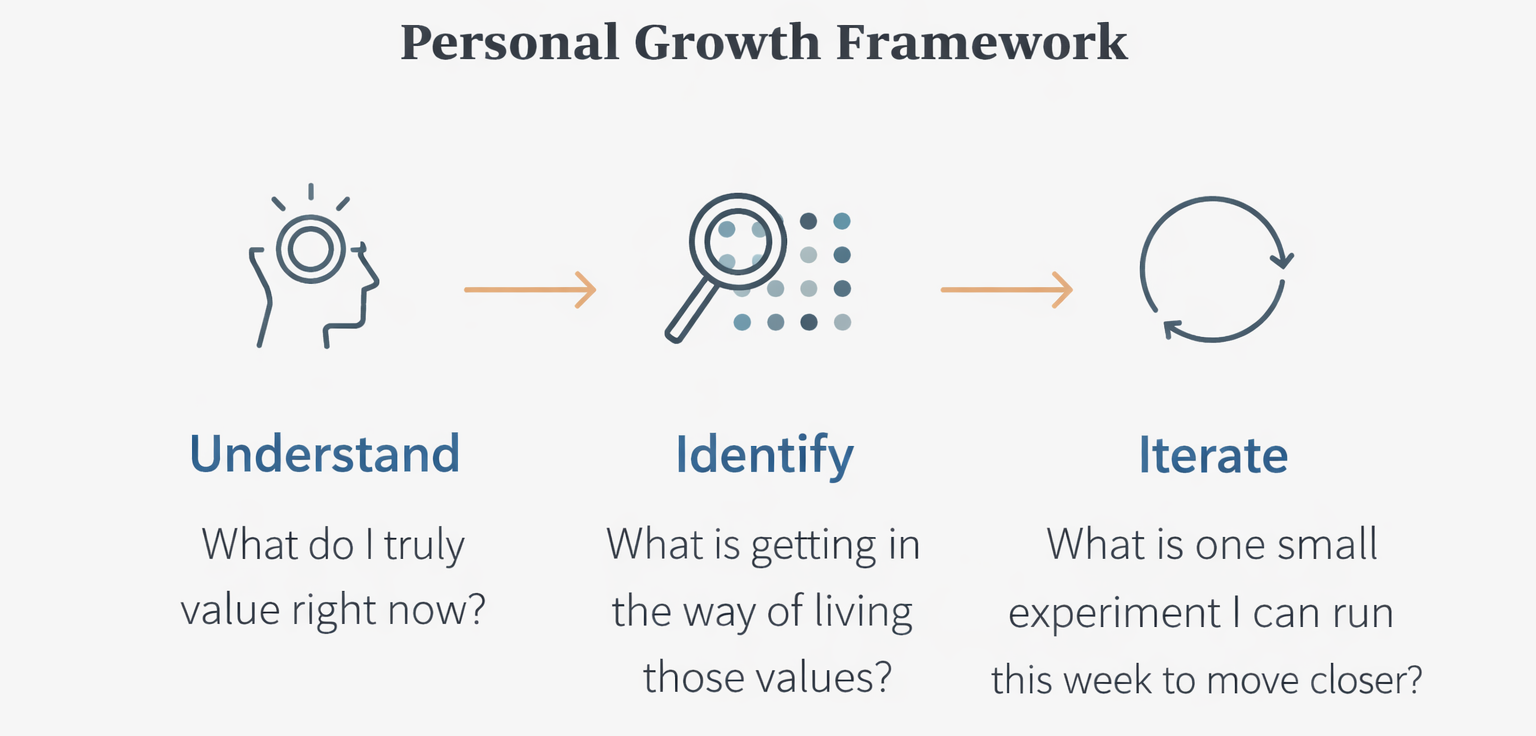Personal Growth — A Self-Development Approach
For individuals redefining success, setting meaningful goals, and overcoming limiting beliefs.
Instead of chasing the next tactic, this framework helps you step back, clarify what truly matters, and make changes that last. It is built on Foundational Thinking’s core process: Understand, Identify, Iterate.
Quick Start: Three Potential Questions
Use these questions any time you feel stuck, restless, or unsure what to do next:
- Understand – What do I truly value in my life right now?
- Identify – What’s getting in the way of living those values?
- Iterate – What one small experiment can I run this week to move closer?
Once you’ve answered them, you can go deeper with the full framework below.

Step 1: Understand — Break Down Core Beliefs
- Identify your core personal values.
What truly matters in your life? - Challenge self-imposed assumptions.
Why do I believe this? Who told me this was true? - Define what long-term success looks like for you, beyond external pressures and expectations.
The goal of this step is clarity. You are naming the foundation you want to build on.
Step 2: Identify — Recognize Growth Constraints & Patterns
- Pinpoint self-limiting beliefs.
What mental roadblocks are holding me back? - Notice which habits contribute to or detract from your progress.
- Determine which environments and relationships support or hinder your growth.
Here, you are mapping the friction between the life you want and the life you’re currently living.
Step 3: Iterate — Apply Small, Meaningful Changes
- Choose one small, actionable change at a time instead of drastic overhauls.
- Test, adapt, and refine personal habits based on real results, not wishful thinking.
- Make sure your growth stays aligned with your core values, not external validation.
Iteration makes growth sustainable. You’re practicing change, not forcing it.
Outcome: A clear, sustainable personal development path driven by intentional growth, not reactive change.
Example: Career Clarity
The Situation
An individual feels unfulfilled in their career but isn’t sure what to change.
1. Understand
They clarify what they value in their work: autonomy, contribution, learning, and impact. They ask whether they are pursuing success based on external expectations or personal fulfillment.
2. Identify
They examine constraints and patterns: which parts of the current job align with their values, which don’t, and how past choices led to this point.
3. Iterate
Before making a drastic change, they test small shifts, taking on a new project, exploring a side business, or developing a new skill to see what truly energizes them.
Instead of a reactive career move, they make an intentional, sustainable shift aligned with their core values.
How to Use This Framework
You can use the Personal Growth Framework in several ways:
- Weekly Reflection
Once a week, journal through Understand → Identify → Iterate for one area of your life (work, health, relationships, finances). - Decision Checkpoint
When facing a big decision, run each option through the three steps to see which is most aligned with your values and constraints. - Seasonal Reset
At key transition points (new year, new role, major life change), revisit your values, refresh your constraints map, and design a new set of small experiments.
Over time, this becomes a way of thinking, your mental model, not just a one-time exercise.
Explore Related Frameworks
Foundational Thinking adapts to different contexts. These frameworks apply the same core process to related challenges.
Applying Foundational Thinking to leadership decisions, alignment, and trust.
A disciplined approach to innovation that focuses on unlearning constraints, reframing problems, and testing solutions.
Applying Foundational Thinking at the individual level to clarify values, challenge assumptions, and build sustainable personal change.
Using first-principles reasoning to identify strategic leverage, reduce noise, and iterate toward sustainable competitive advantage.
Apply This Framework Today
If you want to apply this approach with support, in your organization, team, or product, we can work through it with you.